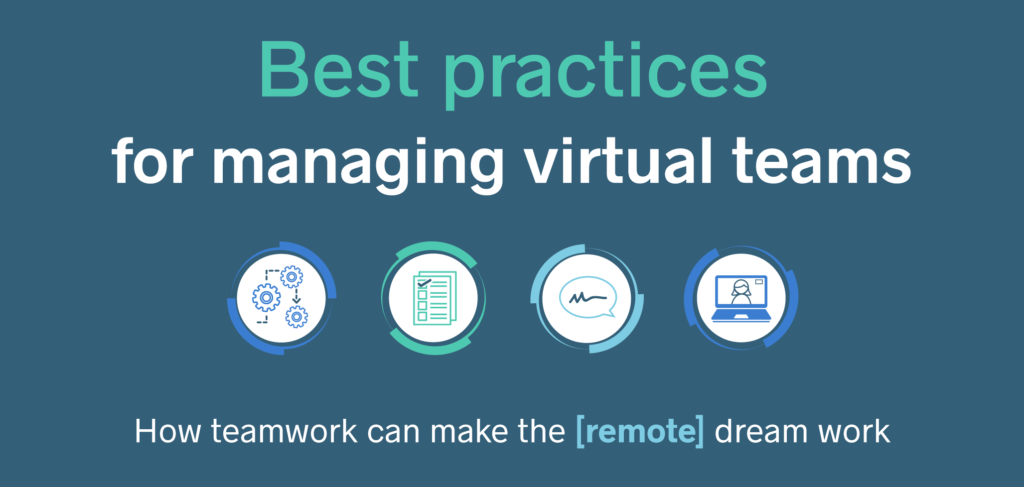Best Practices for Managing Virtual Teams

The abrupt global shift to remote work due to the ongoing COVID-19 pandemic means that many leaders are discovering the unique challenges of managing virtual teams.
According to the literature, virtual teams typically face challenges around communication efficiency, process management, and culture.
Business Talent Group’s marketing department has long functioned as a virtual team; over the years, we’ve honed a series of best practices to stay productive, collegial, and connected. Here’s how we do it.
 Organize your team’s world
Organize your team’s world
When it comes to successfully managing virtual teams, we’ve found that it’s worth taking time to set expectations up front, foster a mutual understanding of how work will be done, and determine how to manage both personal and team preferences. Here’s how we did it:
- We established our team ground rules early on. These range from the practical (cameras on for all video calls) to the philosophical (one of BTG’s core values is to assume positive intent of others). Figure out what works for your team, and don’t forget that enforcement and periodic reminders are critical to making the rules come to life.
- Within our team, we each have defined areas of expertise and responsibilities so the rest of the team always has a go-to person to tackle a certain issue or answer a specific question.
- We commit to staying organized. All the technology in the world won’t help you if your team isn’t organized enough to take advantage of it.
 Commit to a project management tool
Commit to a project management tool
Project management software is an essential tool for managing virtual teams, but it’s not enough to just pick a tool and let folks run with it. Here’s how our team found success:
- Our project management software is our one source of truth. We diligently put every note, file, email, etc., into the software so any team member can figure out the state of any project.
- We have internal conventions for how our team uses our PM tool. From how projects are assigned to how to manage version control, we made sure the entire team speaks the same language.
- We meticulously break up large projects into smaller tasks and assign them out. This helps maintain clarity around exactly who is responsible for what deliverables.
- We make an effort to keep our PM tool clean. We review all outstanding tasks during our weekly stand-ups and re-organize as necessary.
 Use your chat tool diligently
Use your chat tool diligently
For the BTG marketing team, our home office is Slack. From new babies to upcoming deadlines, it all happens on Slack. But no matter what chat tool you use, here are some best practices from how our team leverages it:
- Our team is typically online throughout the workday, but we use statuses to indicate individual availability. This helps folks route questions and set expectations around response times.
- Channel hygiene is important. Our team channel houses only conversations that are relevant to or involve the entire team, and all other conversations are routed to separate topic channels or to smaller groups with appropriate team members.
- We ask each other a ton of questions. Think of it as the virtual equivalent of swinging by someone’s office for a quick chat. It keeps our lines of communication wide open.
- We keep our Slack fun–GIFs, emojis, and silly puns–we embrace it all. But more importantly, this keeps everyone on the team engaged and excited to come back online and see what the conversation is.
 Schedule regular stand-ups
Schedule regular stand-ups
When managing virtual teams, meetings and face time become even more important. Here’s how our team stays in touch:
- Establish a cadence. The BTG marketing team has a weekly stand-up, and all our team members have weekly 1:1s with our SVP of Marketing. Figure out what cadence works best for your team.
- Each meeting has a flexible agenda. There are items that must be covered, but plenty of time is built in for impromptu discussions and brainstorming.
- Not every call has to be scheduled and on the calendar. If you have a quick question or something that is a little too complicated to explain over chat or email, you can always ask for a quick 15-minute call to discuss.
GET THE SKILLS YOU NEED
Thousands of independent consultants, subject matter experts, project managers, and interim executives are ready to help address your biggest business opportunities.